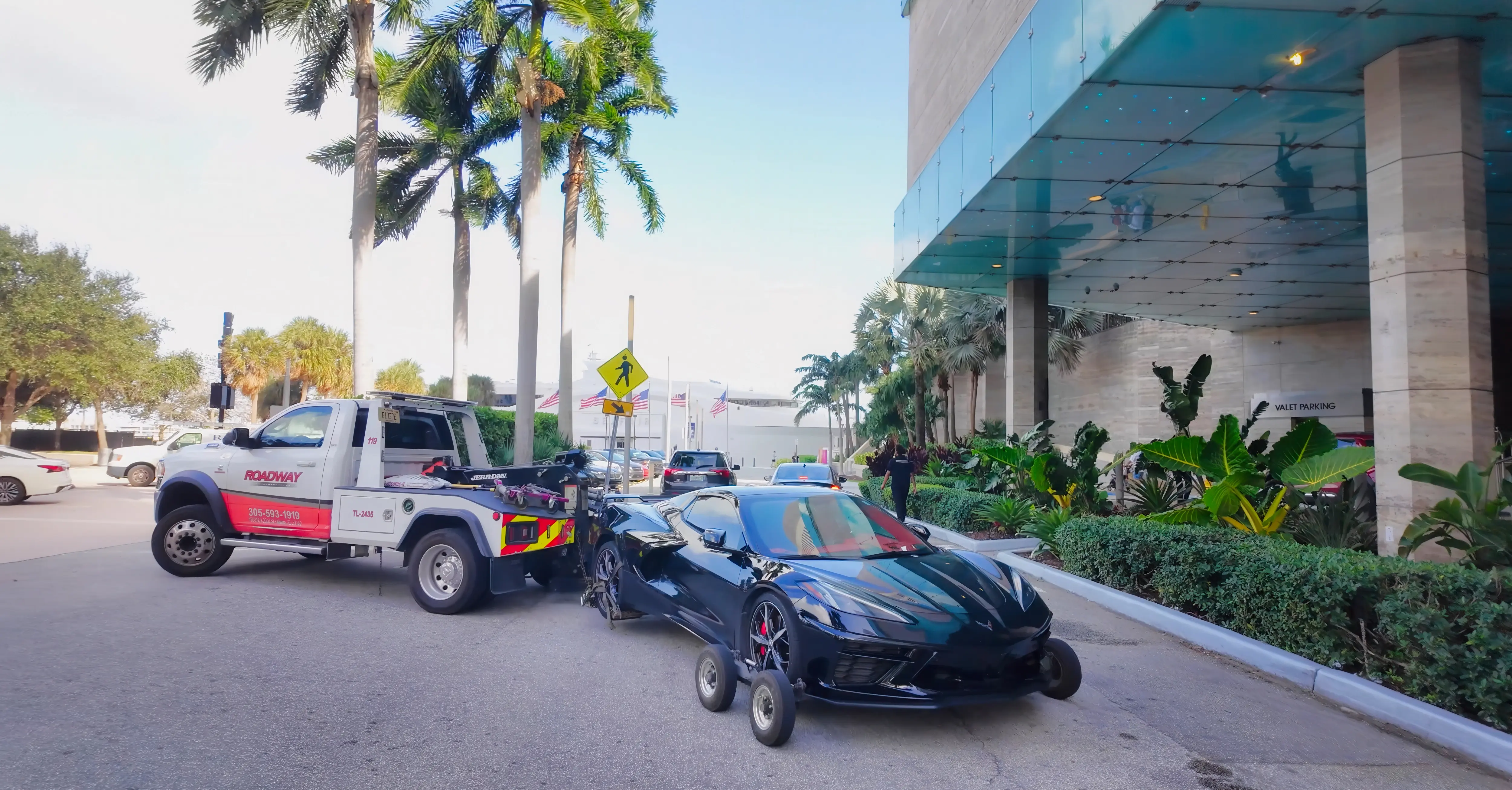Florida’s towing laws give owners of private property, businesses, or parking lots the right to remove illegally parked vehicles. If your car is towed, you have the right to know what happened to your vehicle and where you can get it back, which will likely involve a service fee.
- Police may tow your unattended vehicle if it poses a hazard to area traffic, as well as several other reasons.
- Property owners must report a tow to police within at least 30 minutes of having a car removed from their property.
- To get your car out of an impound lot, you’ll need to be able to provide proof of ownership and pay any applicable costs.
When can police tow a vehicle in Florida?
Florida’s towing laws extend primarily to property and business owners. If you’re interested in the specifics of these laws, you can read on or check out Florida Statute 715.07.
In most cases, it is the responsibility of the property owner to tow a vehicle. They must report the tow to the police department within 30 minutes of removing the car.
Law enforcement officers are allowed to tow abandoned vehicles. Police must contact the Department of Highway Safety and Motor Vehicles to determine the owner and lien holder of an abandoned vehicle and send a notice to the involved parties. If five days pass without a reply, the police will retain the vehicle. They can donate the vehicle or sell it at auction if it isn’t claimed within 35 days.
Some other cases where the police can remove a vehicle include:
- If the vehicle is left unattended on a bridge, a viaduct, or in a tunnel
- If the vehicle is left unattended on a highway or poses a hazard to traffic
- If the vehicle has been reported as stolen
- If the vehicle is blocking a fire hydrant
- If the driver of the vehicle is incapacitated by illness or injury and cannot move the vehicle
- If the vehicle is parked in violation of street cleaning notices
- If the driver is arrested while operating the vehicle
- If the vehicle has no registration or the driver has no license
Of course, this list doesn’t cover all the possible scenarios where your car may be towed by police — the full section of the Florida law can give you more information — but generally, if your vehicle is illegally parked, blocking traffic, or posing a hazard to public safety, the police can tow it.
How to get your car out of an impound lot in Florida
If your vehicle is towed, you must reclaim it within 35 days: After that, the impound lot is free to auction it off.
If you think your car was towed, the first step is to confirm that it hasn’t been stolen: Ask the owner of the property you were parked on if your vehicle was towed. If so, they should provide you with the name of the towing company so you can contact them. You can also call local law enforcement to get the details.
Call the towing company or impound lot as soon as possible: They are legally required to release your vehicle to you within one hour of your request, as long as it’s within normal business hours.
You’ll have to provide proof of ownership, including:
- Driver’s license
- Proof of current registration
- Proof of insurance
If you’re not the legal vehicle owner, or if you don’t have a way to get to the storage facility, someone else can claim the vehicle by using the same documents listed above and a letter of authorization from the owner.
And then there are the fees: Before you pay fees, inspect your car thoroughly to make sure there isn’t any damage.
You may have to pay anywhere from $75 to $800 depending on the following:
- Towing rates
- Daily storage fees
- Administrative fees
- Transfer charge fees
- After-hours fees, lien charges, and auction fees (when applicable)
When can private property owners tow a vehicle in Florida?
Property owners can request a tow truck to remove your vehicle if you are illegally parked on their property. The law extends to all real property, from business to condominiums, and both owners and lessees can take advantage of towing rights.
However, specific requirements must be met to tow a vehicle legally. For one thing, they must give notice before towing your vehicle.
Most commonly, this requirement is fulfilled by “NO PARKING” signs—however, the signs must meet the following requirements:
- Must be visibly placed at each driveway or curb access within five feet from the public right-of-way line or not less than one sign for each 25 feet
- Use at least two-inch light-reflective letters on a contrasting background
- Clearly indicate that unauthorized vehicles will be towed away at the owner’s expense
- Include the words “tow-away zone” in letters at least four inches high
- Provide the name and telephone number of the towing company servicing the area
- Permanently installed with the words “tow-away zone” appearing between three feet and six feet above ground level
- Installed at least 24 hours before a vehicle is towed
- Permit local government inspection of notices before any towing
- If 20 or fewer parking spaces are available, can display a sign stating “Reserved Parking for Customers Only, Unauthorized Vehicles or Vessels Will be Towed Away At the Owner’s Expense”
There are exemptions, of course, including:
- Single-family residences
- If personal notice has already been given to the owner or legal driver of the vehicle
- If a parked vehicle restricts the normal operation of a business
- If the vehicle is blocking access to a private driveway
Property owners may also issue a parking violation notice or tow vehicles that are deemed inoperable, like cars missing engines or wheels. In these cases, the property owner can report the vehicle to law enforcement and tow it after 24 hours. The same applies to abandoned vehicles.
The property owner must use a professional towing service that will store the vehicle in question within a 10-mile radius of the car’s original location. That facility must operate during normal business hours (i.e. Monday through Friday, 8 am to 5 pm).
After towing a vehicle, property owners must report the tow to law enforcement within 30 minutes. If the legal owner of the vehicle questions the tow, the property owner must state the grounds for removal.
What does all this mean for you? Well, if you feel that the property owner did not fulfill the parking notice or towing requirements required by Florida law, you can pursue legal action to prove their responsibility for towing and storage fees. Keep in mind that you would have to pay attorney’s fees or court costs.
When can your car be towed from a parking lot in Florida?
A parking lot can tow your vehicle if it’s blocking access, is improperly parked, or poses a hazard to public safety.
Your vehicle may be towed from a parking lot if:
- It’s blocking an entrance or exit
- It’s parked in a fire lane or a disabled parking space
- It’s within 15 feet of a fire hydrant
- It’s on residential property
- It’s parked in a motel or hotel parking lot in a space designated for a specific room
If you are towed from a parking lot, it shouldn’t come as a surprise. Parking lots must clearly label parking areas and restrictions. Keep an eye out for signage and fire hydrants, and you should be able to avoid a trip to the impound lot.
What are my rights if my car is towed in Florida?
Remember: You have rights if your car is towed in Florida.
These rights include:
- The right to know when and why the vehicle was towed and the storage site where it is being held
- The right to know the date, time, and location of the tow
- The right to know the name of the company that towed your car and what fees to expect
- The right to retrieve your personal property from the vehicle, even if you can’t afford to release the vehicle itself
- The right to sue the towing business if the vehicle was damaged during removal
- The right to notice before your vehicle is towed from private property
Again, if your vehicle has been towed, you can contact local law enforcement for details about where your car is being held and how to release it.
FAQ
-
Is predatory towing illegal in Florida?
-
Can a towing company only accept cash?
Jessica Gibson is an insurance writer with over 8 years of digital publishing experience. Jessica’s passion for writing and research has shaped her mission of creating thoughtful content rooted in sound investigation, and she enjoys uncovering the history behind almost any topic. As a result, Jessica has written more than 200 articles on car and home insurance topics, including insurance and vehicle guides, car maintenance guides, and licensing guides. Prior to joining Jerry’s editorial team, Jessica created and edited content for wikiHow and earned a Master’s degree in European History.

-
Licensed Insurance Agent
R.E. Fulton is an expert insurance writer specializing in car ownership topics from car shopping and loan advice to insurance and repair guides. R.E.’s mission is to create unique and accessible content that helps readers to become more successful and independent car owners. R.E. has written and edited over 900 high-performing articles for Jerry, with an average of 1 million+ views. As a senior writer on Jerry’s editorial team, R.E. draws on over 10 years of experience as a professional writer and digital publishing specialist. Prior to joining Jerry’s editorial team in 2021, R.E. worked as a writing coach at Columbia University, the Rochester Institute of Technology (RIT), and the University of Rochester. They serve as a managing editor for peer-reviewed history publication Nursing Clio, where their work has appeared regularly since 2015.







